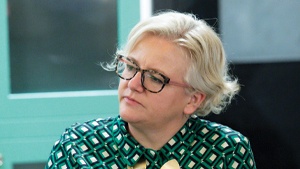Nathalie Tidman, Legal Business and The In-House Lawyer: Is it an oversimplification to say that inflationary pressure, if it eases, will kick-start M&A again?
Eric Knai, Eversheds Sutherland: We have been having a lot of discussions with our clients but also with investment bankers, bankers and economists. They say that inflation is a factor, but only one of a number of factors that impacts M&A.
For us, there are three basic things that drive M&A. The first is the confidence that buyers have in the prospect of their own businesses. We have an environment where there is a whole bunch of uncertainty, and the immediate reaction is to think that is going to slow the volume of M&A down.
The second thing is that a deal is essentially a buyer and a seller agreeing on a price. Therefore, valuation is key. Valuation right now is super tricky.
Muriel Petit, Jefferies: Most of the big names in consumer have a lot of money but they may be uncertain about buying. It is about their own confidence, but more importantly it is about the trust they have in the business plan being presented to them by the sellers. That is where inflation comes in. Can you pass inflation to the end consumers? Can you protect your gross margin or not?
The lack of visibility is why the valuation is difficult. You cannot reset the business plan today because nobody has a clue what is going to be happening in China in the six months to come. Is Russia and Ukraine going to be solved? Is the energy problem going to be solved?
Simon White, Cognizant: In IT services, when you are divesting or buying something, you are generally buying people. You are not buying a physical asset or a platform in general. One of the things that comes down to valuation is how sticky the people will be. If all I am buying is people and they all leave, then what am I buying? Covid drove most companies to a faster digital journey. In IT services there is an absolute shortage. There are not enough people. That has driven wage inflation at a crazy rate in the IT services industry globally.
Because of wage inflation and lack of IT resources, the stickiness of employees is as ‘unsticky’ as it has ever been. Therefore, the reticence in buying is that, on the one hand, you think, ‘I desperately need more people. I am going to go and buy their company,’ but you are also at the same time saying, ‘What is the true value? If I buy it and that culture fit is not there, the people I have bought aren’t going to stay.’ I have not seen that tension before in my 20 years in the space.

Sarah Massey, ADP: Some of it comes down to why you are making the acquisition. Are you making it to take a share of the market? In that case, it is going to be less about inflation. If you are in consumer, one of your areas to sell consumer to is private equity, and that is going to be very flat at the moment because it is very high risk for them right now. If you are selling beauty brands, for example, that has been a big area where you have seen private equity go into. They are now going to struggle with those valuations for that reason.
You might be doing an acquisition because you can concentrate your supply chain, it gives you more power with different suppliers. In those circumstances, again, inflation is going to be less of an issue. From January 2022, I would have said that employees had a huge amount of power in tech, in the sense that they could move when they wanted. They could demand the salaries that they wanted. Following the events at Facebook and Twitter, we have seen a huge flood of people into the market. We are seeing employees come back to us who had moved, because they are now worried about redundancies. That will also shift the tide.
Muriel Petit: In consumer, for the last ten years, people buy for growth. If you buy the company, you need to be convinced about growth. Can I transfer the price increase to my client? Are the consumers going to consume as much as before? This is creating a pause. The industry is cash generative so the trade buyers have no issue with access to capital.
On the private equity side, they have the capital. Most of the private equity funds are finalising their fundraising. Whether they are private equity relating to consumer or not, many have been raising tens of billions, but there is a short-term issue related to lack of debt availability. It has been difficult in the last six to nine months to find debt for LBO.
Eric Knai: The availability and cost of capital was the third thing that we thought would be driving M&A or holding it back. The cost of borrowing for corporates has gone up fivefold in the last 12 months. The cost of leveraged finance has doubled. The volume of leveraged finance transactions has gone down by 75%. Deal volumes are down about 25%.
In my view, there are two main drivers. There are inflationary pressures coming from supply chain bottlenecks resulting from Covid which still exist. The second thing is the cost of energy.
Deal value is down 30% against last year but last year was a record-breaking year. However, deal volume was only down 3% against last year. What does that mean? It means that size matters. Large-cap is really taking it on the chin.
Nathalie Tidman: From the data collected so far on M&A transactions in 2022, there has definitely been a hit in terms of deal value. Is there going be a bounce-back towards the end of the year?
Muriel Petit: This year is gone. The question is whether you can even bet on something in the first quarter of 2023, which is totally unknown because the financial market has been closed for six to nine months. It could continue to be closed for three more months, but nobody has a clue about that.
Eric Knai: An interesting point that came out with some of our banking clients that are lenders was that the end of the year is going to be a bit of a mechanical tipping point. Come 1 January, they will mark to market and their lending capacity should increase as they will be starting from a clean sheet but it is unclear whether that will have a visible effect on transactional volume in the first two months of the year.
Muriel Petit: If you have a business which is to be sold, my best advice would be to document everything very well. Prepare your financing. Make sure you have a relationship bank in place. Be ready to go at the right moment with very good preparation.
Right now in M&A, whatever the sector is, only the good assets are going. In 2021, even average assets were selling well. When you have an average asset, try to keep it if you can. You do not want to have somebody in phase two coming back on his price because he is unsecured. You need to have something pre-packaged. The more you can share in the first phase or even before the first phase, the better, because then buyers have the capacity to judge, and you will too in terms of competitive tension. You can see what the pressurising point would be. In the last six months my recommendation to sellers about the nature of due diligence documentation has totally changed. Now it is more about your supply chain sustainability and your price increase elasticity.

Pete Blythman, BT: At BT, we have an awful lot of different bits of business, and it is about doing all that pre-packaging early, ensuring you can tell the buyers how you are going to separate everything out and how you are going to do the carve-out. You do all that preparation, and when you get to market you can answer all the questions and hope that they will take the business off your hands at that point.
Rinesh Sheth, Informa: It is interesting to hear about the carve-outs, because at Informa we have just completed a big divestment programme of our Intelligence Information business. It is interesting hearing your advice about carve-outs and preparing as much as possible, because at the beginning of the year we were planning to run many of our processes as auctions. Our processes for three parts of this business were all accelerated and ultimately pre-empted. Timing was opportune for us given how the market moved in the second half of the year. Us retaining a stake in two of the businesses also helped the speed of those processes. We retained between 15% and 20% of those businesses.
Private equity was ultimately attractive because of the speed at which they could execute. Trade and strategic buyers may not have been able to move so quickly in the timeframes that we wanted to conclude the deals.

Sarah Massey: Private equity can move at speed, whereas trade buyers can be slower because they are having to deal with all these other crises. We were in the middle of an acquisition when Russia and Ukraine started, and so everybody got swamped just dealing with that, so the whole process of the acquisition slowed down. In September we were doing something else and everything slowed down because of the Budget. Literally everything stopped, so our acquisition stopped, and so we all had to deal with the consequences of the Budget. Private equity is not focused on other things or having to deal with a lot of these other crises in the same way that a trade buyer is.
Muriel Petit: Plus there is the intrusion of the due diligence, which is becoming much higher with trade buyers. If you buy growth you need to make sure growth is sustainable.
Eric Knai: One of the key outputs of this situation in the last two months and going forward is that we have moved towards sustainable growth. M&A is often about growth, but we are not talking about purchasing to manage the top line anymore. We are talking about looking at the impact on the bottom line. Look at tech stocks which have gone down substantially in the US. Why? Because people are no longer willing to just buy turnover. Growth has got to be sustainable and profitable.
Muriel Petit: Now it is about profitable turnover. There is a cycle in the stock market. You can also find similar trends in M&A.
Simon White: You see the institutional investors hammering CEOs now at board meetings when they have just bought revenue.
Muriel Petit: At Jefferies, one of our biggest franchises is in tech. In the first semester of 2021 all these tech companies went public just for the sake of growth, with limited visibility on roadmap to profitable in the coming ten years.
There is no question any more about profitability and when you are going to become profitable, and tech was the most provocative example. When we are talking about going back to profitability, we are thinking in particular about tech.

Caroline O’Connor, Tractable: Is some of this a good thing? As you said, some of the valuations were just crazy, so is it actually being right-sized? Ultimately, is it a good thing? Going forward, presuming some of the volatility calms down, valuations are going to be a lot more appropriate. People are going to be getting better value for money.
Muriel Petit: Yes, but if you think about it, there is no more debt; the stock market is over. The IPO market has gone down from $93 billion in Q3 2021 to $10 billion in Q3 2022. There will be a moment where something has to happen on financing businesses. M&A is not only about buying synergy. It is also about financing. It is about fundraising, and there is a moment where the machine must restart.
Paula Alessandro, Standard Chartered Bank/Ventures: One of the ventures that I am focused on at the moment is ESG investments, so I would be interested to hear about experiences or thoughts in terms of metrics relating to sustainability. It is easier to measure your financial metrics such as profitability or business plans, but what if a key part of your proposition is sustainability?
Muriel Petit: On KPIs, it is a tough question. There is no deal that does not start or finish with an ESG due diligence. Whatever the sector is, it is part of the conversation.
ESG can take a different dimension, and it is not only with KPIs. One of the topics right now is about putting the supply chain back into Europe, which is of course not only about ESG. It is also about cost. It is about reducing the dependence on freight and so on. Packaging in beauty has been very developed in China, and the big fight for all my clients is to get some alternative in Europe.
Sarah Massey: That came as a result of the pandemic as well, when everything was stuck in shipping ports and nothing could get out. People then said, ‘We have to invest in production in Europe more because we cannot get things from China.’
Eric Knai: One of our clients builds things that require fossil fuels to function. For them, ESG is about whether or not they are going to be around in ten years. It is fundamental. For some companies, ESG is fundamental, for others there is perhaps a bit more marketing involved. It is also interesting to note that the regulations around ESG or green funds is tightening. There is definitely more scrutiny.
We can talk about the outlook for 2023, but it would be interesting to see what happens to those ‘values’ driven brands when you have inflation of 11% in this country. Many people could afford to buy products which correspond to their values until now but if inflation continues at this pace, 24 or 36 months from now, a significant proportion of mid-market consumers may not be in a position to afford to pay for values driven brands anymore.
Muriel Petit: The short-term pressure is about the energy cost and how the various States will reflect on their energy policy. In the current energy shortage, you must step back and think about what is good for getting people and the industry to work, potentially delaying some structural environmental/ESG measures. You will have some short-term disruption, but I trust that the long-term trend is here.
In our research team at Jefferies, we have a team dedicated to ESG that works across all the sectors, because ESG can be 20 different things. We think we are edgy, but today all clients are asking us about what is at stake. What is the benchmarking? What are the competitors doing?
Nathalie Tidman: Could you talk me through what you are thinking about the private equity market? Where are you seeing that market going in terms of alternative, non-traditional financing?
Eric Knai: On average, across all sectors and markets, private equity accounts for about 30% of transactions. In the last quarter it was 38%, so it has gone up, but find us a private equity house that can do deals without the financing. Honestly, I do not know. What I can see in the market right now is that large cap was the first to slow. Our mid-cap and upper mid-cap PE team is still steaming in the UK, whereas private M&A has slowed down slightly.
Muriel Petit: As a veteran of the investment banking industry, I believe strongly that we are in an industry which is reinventing itself depending on the macro and financial environment. Private equity, given the resources and funds they have raised, would have to find an alternative way to invest. I do not think that financing shortage can last for one more year.
I am a believer that the private equity market is here to last because it has a role to play. We will see how and when it comes back.
Nathalie Tidman: What about the geopolitical aspect?
Eric Knai: We are interested in how geopolitics is impacting M&A technically. In other words, foreign direct investment, national security and those types of issues.

We are in a period where foreign direct investment rules and national security rules are being used by nation states strategically for the first time in a long time. Prior authorisations on foreign direct investment used to be a closing issue. Now we talk about it on a kick-off call. CFIUS (Committee on Foreign Investment in the United States) for example has made it very difficult for a Chinese entity to buy assets in the United States.
It will be interesting to look at Germany in the coming months. They have been extremely linked with China, selling them goods and services. The geopolitical situation has put them in a position where they need to make a choice. ‘Do we align with the North Atlantic bloc or do we continue to serve our interests with China?’ Three weeks ago, a small semi-conductor company out of Germany was being bid for by a Chinese firm. That ended up getting blocked by the German authorities. It would appear that they have made their choice, but going forward it will be interesting to look at.
Lastly, in the UK so many deals are now being looked at from a national security and foreign direct investment perspective. In France, a lot more get blocked, but why are we seeing so many more there? Because the scope governing the rules around foreign direct investment of what is strategic has become much larger.
The Chinese were buying strategic assets in Europe several years ago. That would be much more difficult now. It is interesting because the Americans and the Brits have been buying continental European businesses for the last 25 years. Now some French businesses are buying assets in the UK, which brings us to a different point around the question of a strong dollar. Is it important? One of the bankers we were talking to said, ‘Yes, it is interesting. The pound is cheap, so if you buy assets in dollars in the UK, that is a good deal.’ Maybe, but if, and only if, the pound regains its value.
Eric Knai: When you are doing deals in the EU, the European Commission can look at a transaction even after it has closed. The interesting point to note is that, for companies bought below a threshold for competition reviews, if they are considered to be strategic and raise potential competition concerns, transactions can be investigated and subject to remedies as a result of Article 22. Make sure that you ensure your lawyers and competition counsel consider this risk from the outset.
We are starting to get some data around this phenomenon. The regulation is two years old but it is biting now because the geopolitical situation is such that these types of assets are now perceived to be strategic and can potentially significantly limit future forms of competition. Small startups in the tech industry were being bought by large tech groups and competition regulators are concerned about these types of deal. When companies with material market positions in sectors such as tech and life sciences (but others as
well) buy startups they need to consider these regulations from the outset.

Simon White: How often is that actually enforced?
Eric Knai: I do not know, but it is the same thing as data protection and GDPR. How often do they impose full sanctions under those regulations? Not often.
It drives behaviour. It is a reflection of the degree to which the liberty with which we did everything up until two or three years ago has shrunk.
Paula Alessandro: Sometimes there can be reactions to strategies like that. As a senior lawyer, I’ve seen the regulator tell a bank they had to do a partial divestment as part of a regulatory sanction.
In the end, as the deal team on the other side of the table to the attempted acquisition, we got the sense the other bank was just willing to pay a fine. It went back to the regulator. The regulator said: ‘If the IT is too complex to merge, OK pay the fine. You have been negotiating it for close to three years.’
The panellists
Hosts
- Nathalie Tidman, Editor, Legal Business and The In-House Lawyer
- Eric Knai, Head of M&A (international), Eversheds Sutherland
Participants
- Paula Alessandro, Standard Chartered Bank / Ventures
- Pete Blythman, BT
- Lee Holland, Howden Group Holdings
- Elaine Hutton, NTT Security
- Sarah Massey, ADP
- Susan McFarlane, Mitsubishi UFJ Trust International
- Caroline O’Connor, Tractable
- Abby Olushola, Afrissance
- Tanveen Panesar, Enthuse
- Muriel Petit, Jefferies
- Bratin Roy, Ripjar
- Rinesh Sheth, Informa
- Simon White, Cognizant


